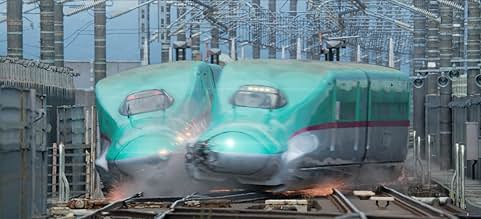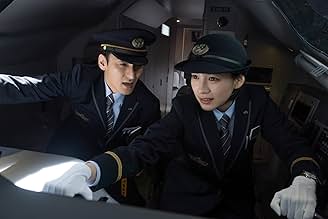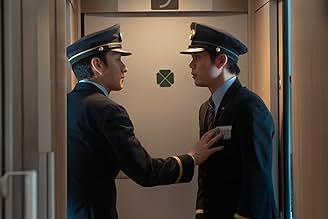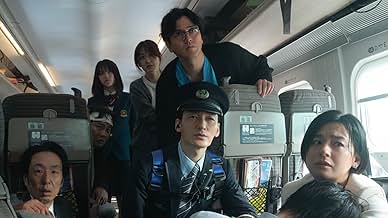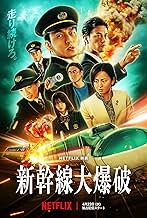AVALIAÇÃO DA IMDb
6,2/10
7,7 mil
SUA AVALIAÇÃO
Um grupo amarra bombas em um trem-bala japonês na tentativa de extorquir dinheiro do governo.Um grupo amarra bombas em um trem-bala japonês na tentativa de extorquir dinheiro do governo.Um grupo amarra bombas em um trem-bala japonês na tentativa de extorquir dinheiro do governo.
- Direção
- Roteiristas
- Artistas
Avaliações em destaque
I just finished watching Netflix's new "Bullet Train Explosion" (2025) and couldn't help but notice all the comments claiming it's "just a Speed ripoff." Oh, sweet summer children of cinema...
For those whose film history knowledge apparently begins with Keanu Reeves, allow me to enlighten you: "Shinkansen Daibakuha" isn't copying Speed (1994). It's a REBOOT of the ORIGINAL "Shinkansen Daibakuha" from 1975 - a Japanese disaster thriller released NINETEEN YEARS BEFORE "Speed" even existed.
That's right. The "can't slow down or it explodes" concept that everyone associates with "Speed" was actually pioneered by this Japanese film starring Ken Takakura, Sonny Chiba, and other legendary Japanese actors nearly two decades earlier. The original featured Japan's bullet train that would explode if it dropped below 80km/h, with criminals demanding ransom money.
So who copied whom? If anything, "Speed" borrowed from Japan, not the other way around. Shinji Higuchi's new Netflix adaptation is simply bringing a Japanese classic back to life for a new generation.
The irony of Western viewers accusing a Japanese reboot of copying an American film that may have been "inspired" by the original Japanese concept is absolutely delicious. It's the perfect embodiment of that meme where someone makes a joke, someone else says it louder, and gets all the credit.
For those whose film history knowledge apparently begins with Keanu Reeves, allow me to enlighten you: "Shinkansen Daibakuha" isn't copying Speed (1994). It's a REBOOT of the ORIGINAL "Shinkansen Daibakuha" from 1975 - a Japanese disaster thriller released NINETEEN YEARS BEFORE "Speed" even existed.
That's right. The "can't slow down or it explodes" concept that everyone associates with "Speed" was actually pioneered by this Japanese film starring Ken Takakura, Sonny Chiba, and other legendary Japanese actors nearly two decades earlier. The original featured Japan's bullet train that would explode if it dropped below 80km/h, with criminals demanding ransom money.
So who copied whom? If anything, "Speed" borrowed from Japan, not the other way around. Shinji Higuchi's new Netflix adaptation is simply bringing a Japanese classic back to life for a new generation.
The irony of Western viewers accusing a Japanese reboot of copying an American film that may have been "inspired" by the original Japanese concept is absolutely delicious. It's the perfect embodiment of that meme where someone makes a joke, someone else says it louder, and gets all the credit.
Japanese is still Japanese. Even though they have great material, the results made me frustrated. First I saw the trailer, it seemed like the movie from 90s - Speed, Keanu Reeve and Sandra Bullock - a Japanese version. I had high expectation due to the explosion was about their high speed technology train like Shinkansen bullet train that serves many people daily. During the line, I was getting upset by boring dialog, drama-with-no-reason made me sick, and overall was pretty disappointed. The signature of Japanese movie is about their spirit, responsibility, patriotism etc. But those built overall movie worsen.
The villain supposed to hit my nerve and made me stunned, but no. There was not solid and believable; or AKA enough to convince; the motive of making the train exploded.
The villain supposed to hit my nerve and made me stunned, but no. There was not solid and believable; or AKA enough to convince; the motive of making the train exploded.
With all due respect to my fellow critics-whose insights I genuinely admire-I must gently (but firmly) tap the brakes on this recurring assertion that Bullet Train Explosion is little more than a Japanese Speed. Yes, both films hinge on the same pulse-quickening premise: a vehicle that must maintain velocity or detonate spectacularly. But before we declare Speed the originator of this trope, let's give history its proper due-and a little reverence.
Because long before Keanu Reeves fired off "Pop quiz, BLEEP," and Sandra Bullock white-knuckled her way into action-movie legend, there was The Bullet Train (Shinkansen Daibakuha, 1975). A Japanese thriller that introduced the world to a high-speed train wired to explode if it dipped below a certain speed. Sound familiar? It should. This was the first film to plant a bomb squarely under the concept of velocity. And it was brilliant.
But the lineage doesn't stop there. Even Speed's screenwriter, Graham Yost, credited his inspiration not as some divine spark, but as a cinematic handoff from Runaway Train (1985)-another nail-biter about an unstoppable locomotive hurtling toward oblivion. Here's where it gets even juicier: Runaway Train was originally the brainchild of none other than Akira Kurosawa. Yes, that Kurosawa. The auteur behind Seven Samurai and Rashomon. He wrote the screenplay in the 1960s, envisioning a deeply human, existential thriller set aboard a runaway engine. Though he never got to direct it, his vision survived and roared to life years later under Andrei Konchalovsky.
So let's be clear: Bullet Train Explosion isn't some derivative knockoff trailing behind Speed. It's part of a long, cross-cultural cinematic tradition that spans continents and decades. It stands proudly in a lineage that includes Kurosawa, Konchalovsky, and yes, Jan de Bont. To reduce it to "Speed, but Japanese" is to miss the point-and miss the artistry.
As a Gen-Xer, Speed is sacred to me. It defined a decade of action cinema. It made "mass transit terrorism" an oddly specific genre. And it will always be brilliant. But brilliance doesn't need to be first. And homage is not theft-it's a love letter. Bullet Train Explosion is exactly that: a loud, stylish, blood-soaked valentine to its forebears.
So instead of side-eyeing the similarities, let's celebrate the shared DNA. Let's honor Bullet Train Explosion as a continuation-not a copy-of a global cinematic conversation about speed, stakes, and what happens when you can't stop moving.
With admiration for my fellow Speed disciples (I am one of you), and with cinematic history riding shotgun, I rest my case.
Because long before Keanu Reeves fired off "Pop quiz, BLEEP," and Sandra Bullock white-knuckled her way into action-movie legend, there was The Bullet Train (Shinkansen Daibakuha, 1975). A Japanese thriller that introduced the world to a high-speed train wired to explode if it dipped below a certain speed. Sound familiar? It should. This was the first film to plant a bomb squarely under the concept of velocity. And it was brilliant.
But the lineage doesn't stop there. Even Speed's screenwriter, Graham Yost, credited his inspiration not as some divine spark, but as a cinematic handoff from Runaway Train (1985)-another nail-biter about an unstoppable locomotive hurtling toward oblivion. Here's where it gets even juicier: Runaway Train was originally the brainchild of none other than Akira Kurosawa. Yes, that Kurosawa. The auteur behind Seven Samurai and Rashomon. He wrote the screenplay in the 1960s, envisioning a deeply human, existential thriller set aboard a runaway engine. Though he never got to direct it, his vision survived and roared to life years later under Andrei Konchalovsky.
So let's be clear: Bullet Train Explosion isn't some derivative knockoff trailing behind Speed. It's part of a long, cross-cultural cinematic tradition that spans continents and decades. It stands proudly in a lineage that includes Kurosawa, Konchalovsky, and yes, Jan de Bont. To reduce it to "Speed, but Japanese" is to miss the point-and miss the artistry.
As a Gen-Xer, Speed is sacred to me. It defined a decade of action cinema. It made "mass transit terrorism" an oddly specific genre. And it will always be brilliant. But brilliance doesn't need to be first. And homage is not theft-it's a love letter. Bullet Train Explosion is exactly that: a loud, stylish, blood-soaked valentine to its forebears.
So instead of side-eyeing the similarities, let's celebrate the shared DNA. Let's honor Bullet Train Explosion as a continuation-not a copy-of a global cinematic conversation about speed, stakes, and what happens when you can't stop moving.
With admiration for my fellow Speed disciples (I am one of you), and with cinematic history riding shotgun, I rest my case.
If you're looking a lazy afternoon-watch this weekend that doesn't want you to think too much, this Japanese-version of 'Speed' but on a Bullet Train might be worth considering.
The film was fairly decent until the major reveal that was not really convincing at all, but if you forceful yourself to apply the logic you often see in the news about 'bad actors', you could maaaaybe see why/how it all makes sense.
But like I said, if you don't want to think too much, or at all, this might be one of the decent films for this weekend, or even for passive viewing as you do the dishes or fold your clothes away. Could have been so much better but I didn't care that it was not that and it doesn't feel like a let down.
The film was fairly decent until the major reveal that was not really convincing at all, but if you forceful yourself to apply the logic you often see in the news about 'bad actors', you could maaaaybe see why/how it all makes sense.
But like I said, if you don't want to think too much, or at all, this might be one of the decent films for this weekend, or even for passive viewing as you do the dishes or fold your clothes away. Could have been so much better but I didn't care that it was not that and it doesn't feel like a let down.
Not only was the story intense, but I really loved how they showcased the technical operations of the Tohoku Shinkansen - from the control room decisions to the real-time communication between the operator, conductor, and driver. It all felt incredibly authentic, like watching real professionals in action. Their calmness, precision, and teamwork during high-stress moments really stood out and added so much depth. As a Shinkansen otaku, seeing those accurate procedures and behind-the-scenes details was an absolute thrill and made the experience even more enjoyable. The attention to detail was remarkable.
Você sabia?
- CuriosidadesThe 109 terror case that the TMPD boss and JR officials constantly references is named after the HIkari 109 bullet train that was threatened with a bomb in the original 1975 Bullet Train movie. The Hikari train is one of the original 1964 Shinkansen trains still in service on the Tokaido to San'yo lines. Before it was part of the Shinkansen service, the Hikari was an express train until 1958. It was considered the fastest train in Shinkansen line until Nozomi trains in 1992.
- ConexõesRemake of O Trem Bala (1975)
Principais escolhas
Faça login para avaliar e ver a lista de recomendações personalizadas
Detalhes
- Data de lançamento
- País de origem
- Central de atendimento oficial
- Idioma
- Também conhecido como
- Pánico en el tren bala
- Locações de filme
- Empresas de produção
- Consulte mais créditos da empresa na IMDbPro
- Tempo de duração
- 2 h 14 min(134 min)
- Cor
- Mixagem de som
- Proporção
- 2.35 : 1
Contribua para esta página
Sugerir uma alteração ou adicionar conteúdo ausente



